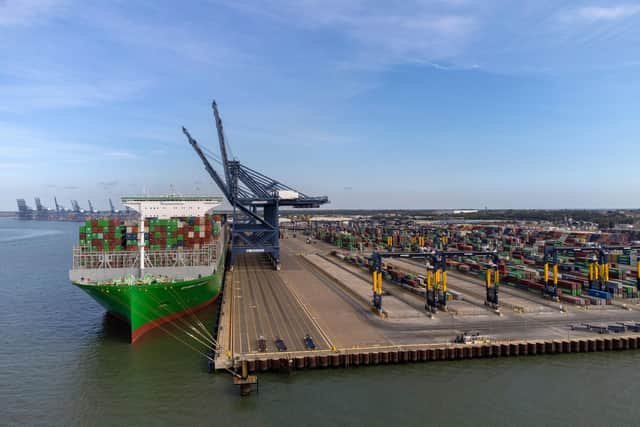Why Felixstowe strike leaves Scottish supply chains exposed
There are several reasons for that. Geography is one, as well as the understandable focus on the strike actions taking place here as part of growing industrial unrest across the Scottish public sector.
But the relevance of the dispute at the UK’s largest container port to people and businesses in Scotland should not be in doubt.
Advertisement
Hide AdAdvertisement
Hide AdThe sprawling site at Felixstowe is a cornerstone of UK supply chains with mainland Europe and the rest of the world. Last year, the port handled £37 billion worth of inbound goods and exports totalling more than £9bn.
The strike action, which has seen nearly 2,000 members of the Unite union walk out for eight days in a dispute over pay, effectively grinds that vast operation to a halt.
For Scottish businesses still trying to recover from the twin blow of the pandemic and Brexit-related disruption, that is unwelcome news.
The action not only impacts sea freight that is transported directly there from Scotland via road and rail, it will have a knock on effect at the likes of Grangemouth, where there are regular sailings to Felixstowe.
The strike has not come out of the blue. It has been clear since the first week in August that the small army of stevedores and crane drivers at Felixstowe would walk out.


But even that foreknowledge is only so useful. Attempting to re-route Felixstowe’s trade is a hugely complex undertaking, given not every port boasts the infrastructure necessary to meet the demand, with many already dealing with capacity, traffic and logistical problems of their own.
The disruption at Felixstowe may not only have an impact on exports. There are warnings that the inward supply of some food, clothing and electronic items is at risk of disruption.
Indeed, more than 7,000 tonnes of freight, including the likes of beans, pasta, and other essential foodstuffs, pass across the border between England and Scotland every 24 hours.
Advertisement
Hide AdAdvertisement
Hide AdNot all of that comes via Felixstowe, of course, but it seems reasonable to ask whether the potential disruption could lead to a further, albeit temporary hike in already spiralling food prices.
Such concerns and others, will have consumers and businesses across Scotland looking on anxiously.
Comments
Want to join the conversation? Please or to comment on this article.
